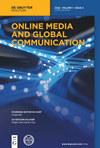Can older people stop sharing? An ethnographic study on fake news and active aging in Brazil
引用次数: 3
Abstract
Abstract Purpose An association between age and misinformation is frequently found in literature, which contributes to a moral panic about older people’s participation in the dissemination of fake news. This qualitative study adds context to this discussion by investigating why older people are motivated to engage with online information and why sharing matters in old age. Design/methodology/approach A 16-month ethnographic study was conducted with a group of older adults in São Paulo, Brazil. Participant observation was complemented by in-depth interviews in order to approach participant strategies to evaluate online content and health information. Findings Participants were connected in multiple WhatsApp groups in which they shared content associated with active aging. Sharing helped them to craft their identity as third-agers at the same time that their work as curators was motivated by the local work-oriented ethics. An indirect system of influences impacted the participants’ decisions to trust and share content. Content was evaluated based on long-term interpersonal trust, while health information was validated by expertise in the healthcare area. “Doctor friends” provided medical guidance by warming the health information that the participants found online. Practical implication Regardless of their level of education, older adults need expert friends to warm health information. This dependency impacts active aging and challenges the idea that the internet could empower health decision-making. Social implications This study provides information for policymakers and industries to understand how older adults can access health information and obtain medical guidance. Originality/value This paper shows how sharing behavior can be influenced by local cultural contexts and contributes to mitigating the causal association between age and fake news.老年人可以停止分享吗?巴西假新闻与活跃老龄化的人种学研究
摘要目的在文献中经常发现年龄与错误信息之间的联系,这导致了对老年人参与传播假新闻的道德恐慌。这项定性研究通过调查为什么老年人有动机参与在线信息以及为什么在老年时分享信息很重要,为这一讨论增添了背景。设计/方法/方法在巴西圣保罗对一群老年人进行了为期16个月的民族志研究。参与者观察辅以深入访谈,以采用参与者策略评估在线内容和健康信息。研究结果参与者被连接在多个WhatsApp群组中,在这些群组中他们分享了与活跃衰老相关的内容。分享帮助他们塑造了自己作为第三年龄层的身份,同时他们作为策展人的工作受到了当地以工作为导向的道德规范的激励。间接影响系统影响了参与者信任和分享内容的决定。内容基于长期人际信任进行评估,而健康信息则通过医疗保健领域的专业知识进行验证。“医生朋友”通过加热参与者在网上发现的健康信息来提供医疗指导。实际意义无论他们的教育水平如何,老年人都需要专业的朋友来提供温暖的健康信息。这种依赖性影响了积极的老龄化,并挑战了互联网可以赋予健康决策权力的想法。社会影响这项研究为政策制定者和行业提供了信息,以了解老年人如何获得健康信息和医疗指导。原创/价值本文展示了分享行为如何受到当地文化背景的影响,并有助于缓解年龄与假新闻之间的因果关系。
本文章由计算机程序翻译,如有差异,请以英文原文为准。
求助全文
约1分钟内获得全文
求助全文
来源期刊

Online Media and Global Communication
Communication, Media Studies, Internet Studies, International Studies, International Relations-
自引率
0.00%
发文量
0
期刊介绍:
Online Media and Global Communication (OMGC) is a new venue for high quality articles on theories and methods about the role of online media in global communication. This journal is sponsored by the Center for Global Public Opinion Research of China and School of Journalism and Communication, Shanghai International Studies University, China. It is published solely online in English. The journal aims to serve as an academic bridge in the research of online media and global communication between the dominating English-speaking world and the non-English speaking world that has remained mostly invisible due to language barriers. Through its structured abstracts for all research articles and uniform keyword system in the United Nations’ official six languages plus Japanese and German (Arabic, Chinese, English, French, Russian, Spanish, Japanese, and German), the journal provides a highly accessible platform to users worldwide. Its unique dual track single-blind and double-blind review system facilitates manuscript reviews with different levels of author identities. OMGC publishes review essays on the state-of-the-art in online media and global communication research in different countries and regions, original research papers on topics related online media and global communication and translated articles from non-English speaking Global South. It strives to be a leading platform for scientific exchange in online media and global communication.
For events and more, consider following us on Twitter at https://twitter.com/OMGCJOURNAL.
Topics
OMGC publishes high quality, innovative and original research on global communication especially in the use of global online media platforms such as Facebook, TikTok, YouTube, Twitter, Instagram, WhatsApp, Weibo, WeChat, Wikipedia, web sites, blogs, etc. This journal will address the contemporary concerns about the effects and operations of global digital media platforms on international relations, international public opinion, fake news and propaganda dissemination, diaspora communication, consumer behavior as well as the balance of voices in the world. Comparative research across countries are particularly welcome. Empirical research is preferred over conceptual papers.
Article Formats
In addition to the standard research article format, the Journal includes the following formats:
● One translation paper selected from Non-English Journals that with high quality as “Gems from the Global South” per issue
● One review essay on current state of research in online media and global communication in a country or region
 求助内容:
求助内容: 应助结果提醒方式:
应助结果提醒方式:


